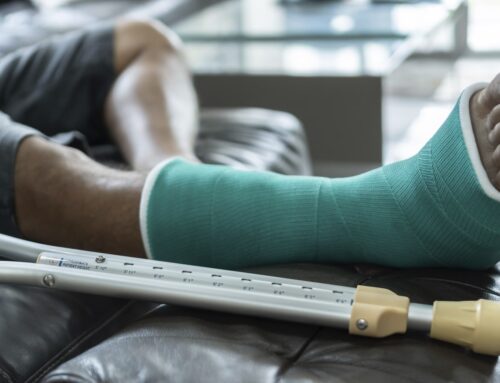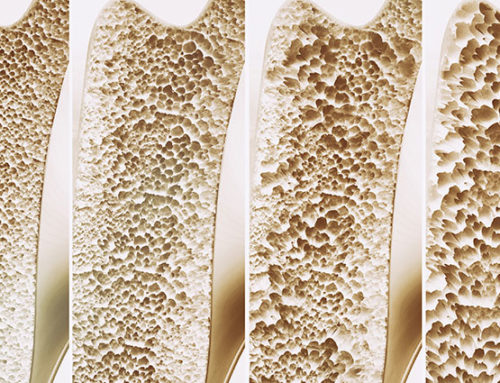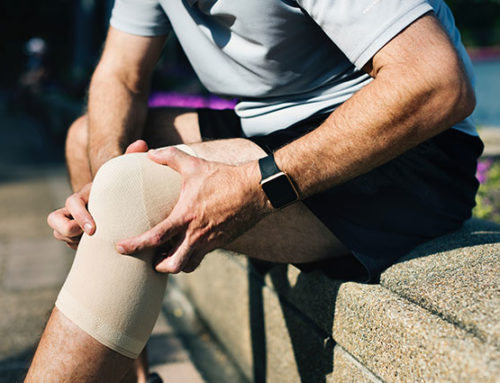As men and women become older, their bones lose mass and strength due to a decline in the body’s bone-rebuilding process. In fact, women can lose up to 5% of their bone mass during the first six years after menopause. In addition to natural bone weakening, adults over the age of 50 are less likely to perform high-intensity, bone-stimulating exercises.
Bone density loss can lead to a range of issues, including osteoporosis, fractures and even life-threatening falls. The good news is there are multiple steps you can take to help strengthen your bones and reduce the threat of pain or injury.
Jump and stomp
Remember throwing a fit as a child? It turns out it was actually good for you! Moderate stress on the bones causes them to become denser and stronger. In a study published in the American Journal of Health Promotion, it was found that people who jumped ten times twice daily increased bone density by .5%. Those who didn’t jump, lost nearly 1.3% of bone density. (The study did not include osteoporosis patients, as jumping is not recommended for patients with weak bones.)
Similarly, adding a few stomps a day has been shown to increase strength in the hips. Try performing four stomps on each foot twice a day. Stomp with enough pressure to crush a can. Remembering to stomp cans before putting them in the recycling bin is an easy way to incorporate bone strengthening into your daily routine.
Stock up on bone-building foods
Everyone knows calcium builds strong bones. The problem is getting enough calcium. The average woman over age 51 needs 1,200 mg of calcium per day, and many fall short of reaching that amount. Drinking milk is an obvious way to consume calcium, but there are plenty of other calcium-rich foods that have less fat. Yogurt, cottage cheese and fish are great for adding calcium into your diet. Increase your intake of vegetables — specifically leafy greens like kale, collards, spinach and bok choy — to promote healthy bones. These vegetables also contain other excellent nutrients such as magnesium, potassium and vitamin K that contribute to overall health.
Prunes and plums are also known to increase bone density. In a recent osteoporosis study, researchers discovered that eating as few as five dried plums daily for six months helped prevent bone loss in older postmenopausal women with low bone density.
Avoid diet dangers
Just as important as consuming foods rich in bone-building nutrients is avoiding foods that are bad for your bones. Caffeine should be consumed in moderation, as it can leach calcium from bones. Salt can also pose problems to your skeletal structure, causing calcium loss and weakening bones. Go easy on bread and other grains, as well. Sulfur compounds found in grains can trigger an increase in the body’s acidity and cause bone deterioration.
Get your beauty rest
According to a study in the Journal of the American Geriatrics Society, people over 50 who get less than six hours of sleep a night had a higher risk of osteoporosis than their peers who slept longer. Poor sleeping habits can damage your body’s ability to self-repair while you sleep.
Getting adequate rest will allow your body the time to it needs to rebuild multiple body systems — including your bones.
Get some sun
Despite the warnings we hear to avoid the sun’s rays, sunlight remains an effective way to take in vitamin D, a valuable resource for maintaining bone health. This vitamin helps to improve the absorption of calcium and enhances muscle function.
The National Institute of Medicine recommends 600 IUs of vitamin D a day, and it’s difficult to get the vitamin D you need from food alone. Fortunately, 15 minutes in the sun is all your body needs to absorb a helpful amount of vitamin D. Try not to be in the sun any longer without applying sun protection.
Have a beer
What could be easier than enjoying a beer or glass of wine to help strengthen bones? Studies of moderate drinkers compared to non-drinkers have shown that moderate drinking, which is no more than two drinks per day for men and one for women, can be linked to higher bone density. Beer may be especially beneficial because of its dietary silicon, a nutrient for bone strength. Remember to stick to only one or two drinks as more than that can weaken bones.
Lift weights
Maintaining an active lifestyle that includes regular exercise may be the most important thing you can do to keep bones healthy and strong. Specifically, activities that require muscle strength such as lifting weights can improve muscle mass and support bone health.
Free weights, wrist weights, exercise bands and resistance machines are all great tools to practice resistance training. Strive for two to three weight training exercises each week.
Other weight-bearing exercises such as walking, jogging, aerobics, dancing or any activity that goes against gravity are also helpful. Just like stomping and jumping, the force of hitting the ground during these weight-bearing exercises stimulates the bones, resulting in increased density.
Add supplements
Eating a healthy, well-balanced diet full of foods containing calcium and vitamin D can help provide the nutrition needed to support healthy bones. However, if you still have nutrient deficiencies, natural supplements may be right for you. Consult with your primary physician before starting supplements to ensure they work with other medications you may be taking.
Help for bone degeneration, osteoarthritis & osteoporosis
Even with best efforts, bones can degenerate, and joints can wear out over time. Cary Orthopaedics’ physicians utilize the latest medical science — including breakthrough technologies for stem cell regeneration – to treat bone conditions and injuries. When you need a top orthopaedic doctor or orthopaedic spine doctor in Raleigh, Cary, Morrisville or Holly Springs, contact Cary Orthopaedics.






